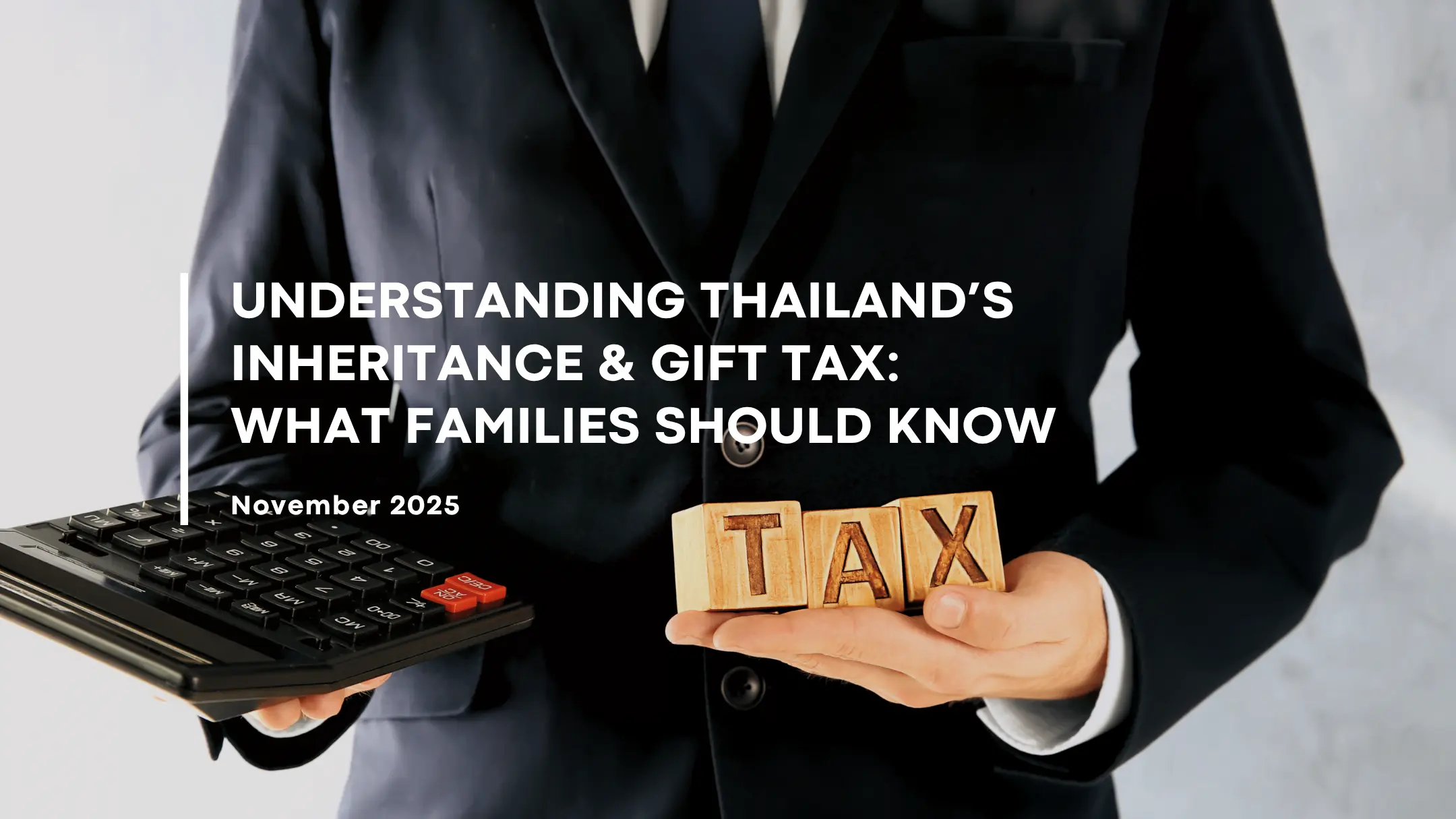Thailand’s inheritance and gift tax rules have been in force since 2016, yet their practical application continues to raise questions, particularly for families managing substantial wealth or planning intergenerational transfers. Although the statutory framework may appear technical at first glance, the core concepts become clearer once the distinctions between inheritance and gift taxation are understood. This article outlines the essential principles and uses the Supreme Court decision No. 2656/2567 — the first and currently the only Supreme Court judgment interpreting the Inheritance Tax Act — to illustrate how the law operates in real cases.
Despite nearly a decade of enforcement, Thailand’s inheritance tax remains extremely modest in both scope and fiscal impact. Based on Revenue Department data, Thailand collects only THB 0.4 to 1.5 billion annually in inheritance tax, an exceptionally small amount compared to the country’s overall tax base of more than THB 2 trillion. In practice, this indicates that taxable estates are exceedingly rare, largely due to the high threshold for liability and the availability of effective planning mechanisms.
1. Inheritance and Gift Taxation: Key Distinctions
Thai law distinguishes clearly between inheritance and gifts. Inheritance occurs when property is received upon the death of an individual and is subject to inheritance tax only when the net value of the taxable assets received by an heir exceeds THB 100 million. In contrast, gifts involve the transfer of property during the donor’s lifetime and are generally governed by personal income tax rules, subject to defined exemptions and preferential rates.
For inheritance, the taxpayer is the heir, except in the case of the spouse, who is exempt regardless of the amount inherited. For gifts, the taxpayer varies depending on the nature of the property: the recipient bears the tax on movable property, whereas the donor bears the tax on immovable property. In practice, gift tax exposure arises more frequently because lifetime transfers are common and subject to annual limitations, while few estates reach the inheritance tax threshold.
2. Inheritance Tax: High Threshold and Limited Reach
Under the Inheritance Tax Act B.E. 2558, inheritance tax applies only when the value of taxable inherited assets exceeds THB 100 million per heir after deducting qualifying debts. The applicable rates are ten percent for most heirs and five percent for ascendants and descendants, while spouses are exempt. Taxable assets include land, buildings, securities, bank deposits, registered vehicles, and certain prescribed financial assets. VAT does not apply to inheritances, and statutory heirs inheriting immovable property are exempt from Specific Business Tax.
Because relatively few estates include more than THB 100 million in taxable assets, the inheritance tax reaches only a narrow population. This limited scope is consistent with the national collection data noted above.
3. Gift Tax: More Common in Practice
Gift tax is embedded within the Revenue Code as a component of personal income tax, supplemented by special exemptions and a capped five percent rate. For movable property, exemptions of up to THB 20 million per calendar year apply to transfers from ascendants, descendants, or a spouse; exemptions of up to THB 10 million apply to transfers made under moral obligation or traditional occasions from others. Amounts exceeding these thresholds are taxed at five percent. For immovable property, transfers to legitimate children benefit from a THB 20 million exemption per year, with the excess taxed at five percent, whereas transfers to others are subject to progressive personal income tax rates.
Foreign gifts are taxable to Thai tax residents only if remitted into Thailand in the same calendar year in which they are received. Certain transfers involving Thai-sourced assets—such as gratuitous transfers of Thai corporate shares—may be taxable in Thailand even if executed abroad.
4. Supreme Court Decision No. 2656/2567
The Supreme Court decision No. 2656/2567 is particularly significant because it is the first and only Supreme Court judgment interpreting the Inheritance Tax Act to date, making it the leading authority on the subject. The case clarifies several important principles regarding the timing and valuation of inherited assets.
The Court held that inheritance is deemed received at the moment of death, drawing on Sections 1599 and 1600 of the Civil and Commercial Code. Consequently, the valuation of inherited property must be determined as of the date of death, not the date on which the heir withdraws funds, redeems securities, or registers transfers. This interpretation ensures certainty in enforcement and prevents timing manipulation.
With respect to bank deposits, the Court confirmed that the taxable amount consists of the balance and accrued interest that should exist at the date of death. Any subsequent entries — whether deposits, transfers, interest accruals, dividends, or redemptions that occur post-death — must be excluded. For unlisted bonds, the Court emphasised that the inherited asset is the bond and the right to redemption, not the redemption proceeds credited after death. Valuation must follow the applicable ministerial regulations, using the issue price if it is lower than the redemption price.
The Court also distinguished inheritance tax from personal income tax under Section 57 bis of the Revenue Code. Inheritance tax is imposed on the heir based on the value of assets at death, whereas post-death income generated by the estate — such as interest or dividends — is taxable to the estate itself. These are separate tax bases and must not be conflated. The Court further upheld penalties where the taxpayer claimed debts that were not genuine liabilities of the estate at the time of death, underscoring the need for accurate and contemporaneous documentation.
5. Planning Tips
A. Optimising lifetime transfers
The limited scope of the inheritance tax makes lifetime planning particularly effective. Gifts may be structured and timed over several years to maximise the available exemptions and benefit from the fixed five percent rate applicable to certain gratuitous transfers. Transfers of immovable property to legitimate children remain one of the most efficient strategies under Thai domestic rules.
B. Restructuring and holding vehicles
Consolidating assets into corporate holding structures can simplify succession, centralise control, and reduce the taxable value of underlying assets. Holding companies frequently provide more predictable valuation outcomes and facilitate orderly transfers of equity interests rather than fragmented underlying assets.
C. Offshore trusts and international structuring
Offshore trusts and international structuring can provide long-term governance, asset protection, and flexible distribution mechanisms for families with complex asset holdings or geographically dispersed beneficiaries. Properly structured trusts may also keep foreign assets — and, in some cases, even Thai onshore assets — outside the scope of Thai inheritance tax, depending on situs, legal ownership, and the trust structure.
D. Insurance-based liquidity planning
Appropriate life insurance policies can enhance estate plans by creating liquidity to satisfy tax obligations or to equalise inheritances among heirs. Insurance is especially useful where estates consist primarily of illiquid assets such as real property or closely held business interests.
E. Documentation and valuation discipline
Given that inheritance tax is assessed strictly as of the date of death, maintaining contemporaneous valuations, accurate financial records, and evidence of genuine debts is essential. Proper documentation reduces the risk of disputes or penalties and simplifies the administrative process for heirs.
F. Cross-border considerations
Foreign assets require thoughtful analysis, as remittance-timing rules and source-of-income principles may affect both inheritance and gift tax exposure. Families with offshore holdings or international investment structures should evaluate how transfers, redemptions, or repatriations may interact with Thai taxation rules.
Conclusion
Thailand’s inheritance and gift tax regime is modest by global standards, and the consistently low collection figures demonstrate how infrequently inheritance tax is triggered. Nevertheless, the Supreme Court decision No. 2656/2567 highlights that technical issues relating to timing, valuation, and documentation can materially affect tax outcomes. With informed planning — whether through structured gifting, corporate or international vehicles, insurance solutions, or improved record-keeping — families can transfer wealth efficiently while maintaining full compliance with Thai law.
© PDLegal Thailand
This article is intended to provide general information only and does not constitute legal advice. It should not be used as a substitute for professional legal consultation. We recommend seeking legal advice before making any decisions based on the information available in this article. PDLegal fully disclaims responsibility for any loss or damage which may result from relying on this article.
Further information
If you would like to evaluate suitable planning options or discuss a structure aligned with your family’s long-term objectives, please feel free to reach out to the following person:

